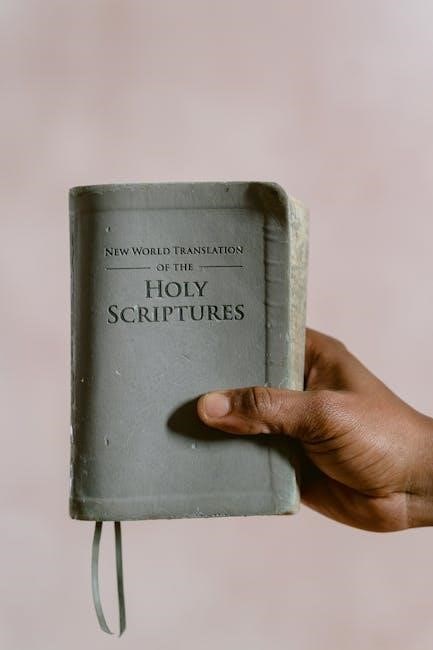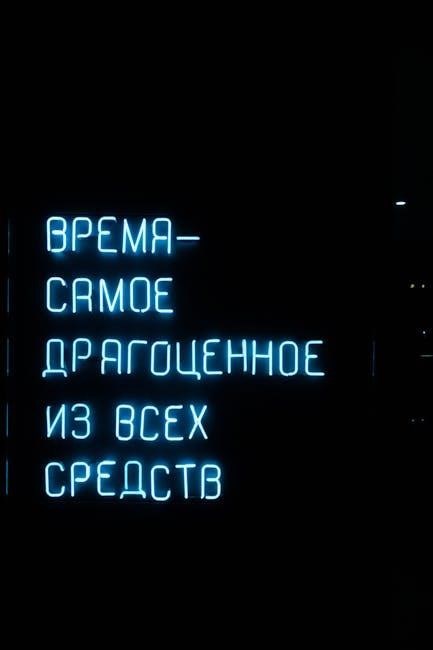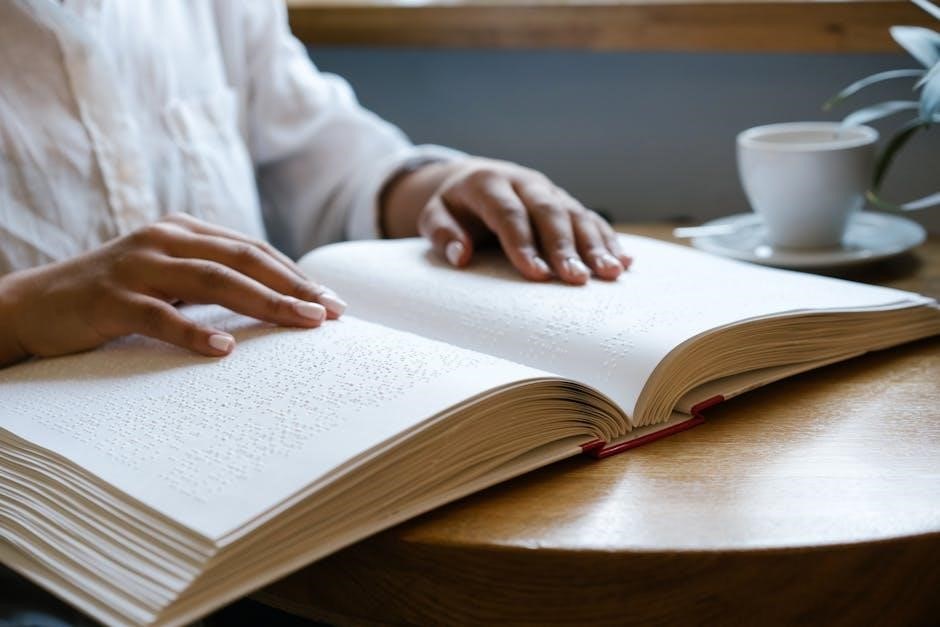Brian Friel, a renowned Irish playwright, crafted Translations in 1980, exploring themes of language, identity, and colonization in 19th-century Ireland. The play delves into the Ordnance Survey’s impact, highlighting the cultural shift through the Anglicization of Irish place-names. Friel’s work is celebrated for its deep socio-political insights, making it a cornerstone of modern Irish theatre. PDF versions and study guides are widely available for academic exploration.
1.1 Overview of Brian Friel’s Work
Brian Friel, a leading Irish playwright, explored themes of identity, language, and cultural colonization. His works, such as Translations and Dancing at Lughnasa, reflect Ireland’s socio-political landscape. Friel’s adaptations of Chekhov’s plays and his role in founding the Field Day Theatre highlight his influence on modern Irish drama, blending tradition with contemporary issues, making his writing deeply resonant and timeless.
1.2 Historical Context of “Translations”
Set in 19th-century Ireland, Translations explores the British Ordnance Survey, which aimed to Anglicize Irish place-names. This historical event symbolized colonial control, leading to the erosion of Gaelic culture and language. Friel highlights the tension between preserving Irish identity and adapting to British influence, reflecting the broader struggle of cultural survival under colonial rule.
Key Themes in “Translations”
Translations explores themes of language, identity, and colonization, reflecting Ireland’s cultural shift during the 19th century. Friel examines how linguistic changes impact national identity, highlighting tensions between tradition and assimilation.
2.1 Language and Identity in Ireland
In Translations, Friel explores how language shapes Irish identity, reflecting the erosion of Gaelic and the rise of English. The play portrays the Anglicization of Irish place-names as a symbol of cultural loss, highlighting tensions between heritage and assimilation. Characters like Owen and Hugh embody the struggle to preserve linguistic traditions amid colonial influence, illustrating the profound impact of language on national identity and cultural continuity.
2.2 Colonization and Cultural Erasure
In Translations, Friel examines the impact of British colonization on Irish culture, focusing on the Ordnance Survey’s role in Anglicizing place-names. This process symbolizes the erasure of Gaelic heritage and the imposition of English dominance. The play portrays how cultural identity is intertwined with language, highlighting the destruction of Irish traditions and the struggle to preserve national character amidst colonial forces.
2.3 The Role of Translation in the Play
Translation in Translations serves as both a literal and metaphorical tool, reflecting the clash between Irish and English cultures. The process of renaming places underscores the loss of cultural identity, while dialogue highlights the power dynamics of language. Friel uses translation to explore themes of communication, misunderstanding, and the tension between preserving heritage and adapting to colonial influences, emphasizing its dual role in bridging and dividing cultures.

The Ordnance Survey and Its Impact
The Ordnance Survey, initiated by British authorities, aimed to map Ireland, renaming places to impose English dominance. This process symbolized cultural erasure, reshaping Irish identity and heritage.
3.1 The Historical Background of the Ordnance Survey in Ireland
The Ordnance Survey began in 19th-century Ireland under British rule, aiming to map the island for administrative control. It involved renaming Irish places to English, erasing Gaelic heritage and imposing colonial dominance. This process, central to Translations, reflects the broader cultural and political dynamics of Irish-British relations during the period.
3.2 The Anglicization of Irish Place-Names
The Anglicization of Irish place-names during the Ordnance Survey stripped Gaelic culture of its linguistic heritage. English replacements for Irish names reflect colonial domination, erasing cultural identity. In Translations, this process symbolizes broader cultural erasure, as Irish traditions and language were suppressed, highlighting the tension between colonial authority and native identity.

Major Characters and Their Roles
The play centers on characters like Owen, Hugh, and Lieutenant Yolland, each embodying distinct perspectives on cultural identity and translation. Their interactions reveal personal and societal conflicts.
4.1 Owen and His Dilemma
Owen, a central character, grapples with the Anglicization of Irish place-names, symbolizing the clash between cultural identity and colonial influence. His role in the Ordnance Survey forces him to confront the erosion of Gaelic traditions, creating an internal conflict between loyalty to his heritage and complicity with British authority. His dilemma reflects the broader struggle of Ireland’s linguistic and cultural identity.
4.2 Hugh and the Value of Language
Hugh, a scholar and teacher, embodies the cultural significance of language in Ireland. He recognizes the necessity of adaptation yet values Gaelic traditions deeply. His poetic insights highlight the richness of Irish heritage, emphasizing language as a cornerstone of identity; Hugh’s perspective underscores the tension between cultural preservation and the inevitability of change, reflecting Ireland’s broader struggle with colonization and linguistic erosion.
4.3 Lieutenant Yolland’s Perspective
Lieutenant Yolland, an English cartographer, approaches Ireland with curiosity and enthusiasm, seeking to understand its culture. His role in the Ordnance Survey, however, symbolizes the broader colonial project. Yolland’s naive fascination with Irish place-names contrasts with the cultural erasure his work facilitates. His eventual disappearance underscores the tragic consequences of colonial intrusion and the irreparable loss of cultural identity;

The Significance of Language in the Play
Language in Translations mirrors Ireland’s cultural shift, as Gaelic declines and English rises, reflecting the erosion of Irish identity and the impact of colonial influence.
5.1 The Loss of Gaelic and the Rise of English
The decline of Gaelic and the imposition of English in Translations symbolize Ireland’s cultural erasure. The Ordnance Survey’s renaming of places mirrors the broader colonial suppression of Irish identity, as English becomes the dominant language, displacing Gaelic and undermining traditional heritage. This linguistic shift reflects the play’s exploration of cultural loss and the imposition of foreign dominance.
5.2 Language as a Tool of Power and Control
In Translations, language emerges as a potent tool of colonial power, with English imposed over Gaelic, symbolizing cultural subjugation. The renaming of Irish places reflects Britain’s exertion of control, erasing native identity. Friel highlights how language becomes a weapon of domination, shaping perceptions and reinforcing hierarchical structures, while indigenous voices are marginalized, illustrating the profound political and social implications of linguistic dominance.

Cultural and Political Dimensions
Brian Friel’s Translations examines the cultural and political tensions of 19th-century Ireland, exploring how colonial forces reshaped Irish identity through language and territorial renaming, reflecting deeper societal conflicts.
6.1 The Play’s Reflection of Irish Identity
Translations mirrors Ireland’s identity crisis through its portrayal of a community grappling with cultural erasure. The play reflects the tension between Gaelic traditions and English influence, as characters like Owen and Hugh embody the conflict of preserving heritage versus adapting to colonial pressures. This duality underscores the fragility of Irish identity during the Ordnance Survey, resonating with postcolonial theories on cultural hybridity and resistance.
6.2 The Politics of Linguistic Identity
In Translations, language serves as a political tool, reflecting the power dynamics of colonization. The shift from Gaelic to English symbolizes the erasure of Irish identity, while the characters’ interactions highlight the tension between cultural preservation and assimilation. This linguistic conflict mirrors the broader political struggle, emphasizing how language shapes national identity and resistance in a colonized society.
Postcolonial Theory and “Translations”
Brian Friel’s Translations aligns with postcolonial theory, exploring language’s role in cultural domination and identity loss. Bhabha’s mimicry and Ngugi’s views on linguistic imperialism resonate deeply in the play’s portrayal of Gaelic erosion and English imposition, reflecting Ireland’s colonial struggle.
7.1 Homi K. Bhabha’s Concept of Mimicry
Homi K. Bhabha’s concept of mimicry is reflected in Translations through characters like Owen, who embodies the tension of imitating colonial culture while grappling with Irish identity. This ambivalence highlights the psychological impact of colonial domination, as mimicry creates a hybrid identity that neither fully belongs nor resists, mirroring Ireland’s complex relationship with British rule in Friel’s narrative.
7.2 Ngugi Wa Thiong’o’s Views on Language and Colonization

Ngugi Wa Thiong’o’s theories on language as a tool of colonization resonate in Translations, where the Anglicization of Irish place-names erases Gaelic culture. Ngugi’s emphasis on language as a marker of identity aligns with Friel’s portrayal of linguistic displacement, highlighting how colonial powers use language to assert dominance and suppress native cultures, a theme central to postcolonial critique in Friel’s work.

The Play’s Legacy and Impact
Translations is hailed as a modern classic, deeply influencing Irish theatre and sparking global academic interest. Its exploration of cultural identity and colonization remains highly relevant today.
8.1 Influence on Modern Irish Theatre
Translations has profoundly shaped modern Irish theatre, inspiring playwrights to explore themes of identity and cultural heritage. Its nuanced portrayal of linguistic and political struggles resonates deeply, influencing contemporary works and establishing Friel as a pivotal figure in Irish drama. The play’s success also led to the founding of the Field Day Theatre Company, revitalizing Irish theatre’s global reputation.
8.2 Adaptations and Revivals

Translations has seen numerous revivals, including a notable production by the National Theatre, cementing its status as a modern classic. The play’s universal themes continue to resonate, making it a staple in theatrical repertoire. Its influence extends beyond the stage, with PDF versions and study guides widely accessible, ensuring its relevance in contemporary theatre and academic discourse.

Comparisons with Other Works by Friel
Brian Friel’s Translations shares themes of identity and cultural conflict with his other works, like Dancing at Lughnasa, blending personal narratives with broader political contexts.
9.1 “Dancing at Lughnasa” and Its Similar Themes
Brian Friel’s Dancing at Lughnasa mirrors Translations in its exploration of Irish identity, cultural decline, and the tension between tradition and modernity. Set in 1930s Donegal, the play uses music and dance to symbolize the fading of Gaelic traditions, echoing the linguistic erosion depicted in Translations. Both works reflect Friel’s poignant commentary on Ireland’s struggle to preserve its cultural heritage amidst external influences.
9.2 Friel’s Adaptations of Chekhov’s Plays
Brian Friel’s adaptations of Chekhov’s plays, such as The Bear and Afterplay, showcase his mastery in reinterpreting classics. These works highlight Friel’s ability to blend Chekhov’s original themes with his own unique storytelling style, demonstrating a deep understanding of human emotion and cultural nuances. His adaptations are celebrated for their faithful yet innovative approach to Chekhov’s legacy.
Accessing “Translations” in PDF Format
Translations by Brian Friel is widely available in PDF format through academic platforms like the Internet Archive and scholarly databases. Ensure responsible use of these resources.
10.1 Sources for Downloading the Play
PDF versions of Translations can be accessed through platforms like the Internet Archive and academic databases such as JSTOR or academia.edu. Additionally, many university libraries offer digital copies for students and researchers. Official publishers like Faber and Faber also provide downloadable editions. Ensure to use authorized sources to support copyright compliance and access high-quality materials.
10.2 Academic Resources and Study Guides
Academic resources and study guides for Translations are available on platforms like Google Scholar and JSTOR. Many universities offer detailed study packs analyzing themes, characters, and historical context. Specific studies, such as those by Adineh Khojastehpour and Behnam Mirzababazadeh Fomeshi, provide in-depth critical essays and postcolonial analyses, aiding scholars in understanding the play’s socio-political dimensions.